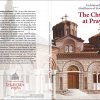Filmovi Maje Novaković, Igora Ćorića i Ivane Todorović nagrađeni su na upravo završenom 15. Festivalu filmova jugoistočne Evrope (SEE Film Festival) u Los Anđelesu, održanom onlajn.
Kako prenosi SEEBIZ, dokumentarac Maje Novaković "A sad se spušta veče" proglašen je najboljim u kategoriji kratkog dokumentarnog filma.
Njen film prikazuje život dve bake koje žive izolovano u brdima istočne Bosne. Priroda je entitet sa kojim bake "pričaju", osluškuju ga i poštuju. Film ističe nematerijalnu kulturnu baštinu kroz prikaz bajalica i rituala protiv vremenskih nepogoda, grada i oluje, navodi se u opisu ostvarenja.
Film "Prolaz" Igora Ćorića, nagrađen kao najbolji u selekciji kratkometražnog animiranog ostvarenja, nastao je pod okriljem studija "Artrake", a sinopsis u jednoj rečenici glasi: "Mali dečak se suprostavlja neprijatelju totemom koji je sam sagradio od ostataka svog plemena".
U kategoriji kratkog igranog filma specijano priznanje osvojila je Ivana Todorović za film "Kada sam kod kuće".
Film govori o Mariji, koja se nakon nekoliko godina života u inostranstvu vraća u porodični dom da bi se suočila sa traumom iz detinjstva.
Izvor: 021





